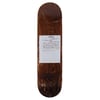Pass System - reissue

Colonialism is a skateboard company based out of Regina, Saskatchewan, in Treaty 4 (1874) Territory. Our primary objective is to educate the public on elements of our shared history and culture of Aboriginal peoples in Canada through our love for skateboarding.
For decades, efforts have been made to rewrite and even conceal the history of colonization in what we now call ‘Canada.’ Historically, Aboriginal peoples have been either omitted from accounts of Canadian history or depicted as savages, free loaders or “needy Indians” while conversely colonizers/settlers were often depicted as great ‘pioneers' in textbooks and the effects of colonization, such as legislation like the Indian Act (1876) were rarely discussed in Canadian society. Similarly overlooked is the connection between colonial policies and legislation such as the Residential School system, the Reserve system, Indian Agents, and the Sixties Scoop that continue to affect all aspects of Aboriginal people’s lives. These events have not, until recently, garnered much of the general public’s attention.
The first board graphic from Colonialism highlights one example of colonization – the Pass and Permit system – that was implemented in parts of Western Canada during the late 19th and early 20th centuries. The Pass and Permit system was designed to control Aboriginal people’s movement and economic activities (for example, Aboriginal peoples needed a permit to sell goods as well as a pass to leave the Reserve, visit children in Residential Schools or visit families in neighbouring communities which led to destruction of families) and prevent any disruptions to the Canadian government’s settlement plans for the prairies. The Indian Act (Indian Agents) took control over Aboriginal people’s way of life, including their land, governance and prohibition of ceremonies and cultural traditions.
The image on the board that you have purchased is a copy of an actual permit that was written by an Indian Agent from Treaty 7 (1877) Territory. This particular document granted Big Prairie Head of Sarcee Indian Reserve (Tsuu T’ina Nation) permission to leave his reserve and sell livestock for one day. If he had not returned to the reserve before the end of the day, or had sold more livestock than what was approved by officials, he would have faced up to three months in prison or five hundred dollars in fines (or both).
The Pass and Permit system represents one example of how the oppression of Aboriginal peoples through restrictions of movement and economic control have negatively impacted Aboriginal peoples then and contributes to inequality and strained relations now.
Image Source: Glenbow Museum Archives in Calgary, Alberta.
